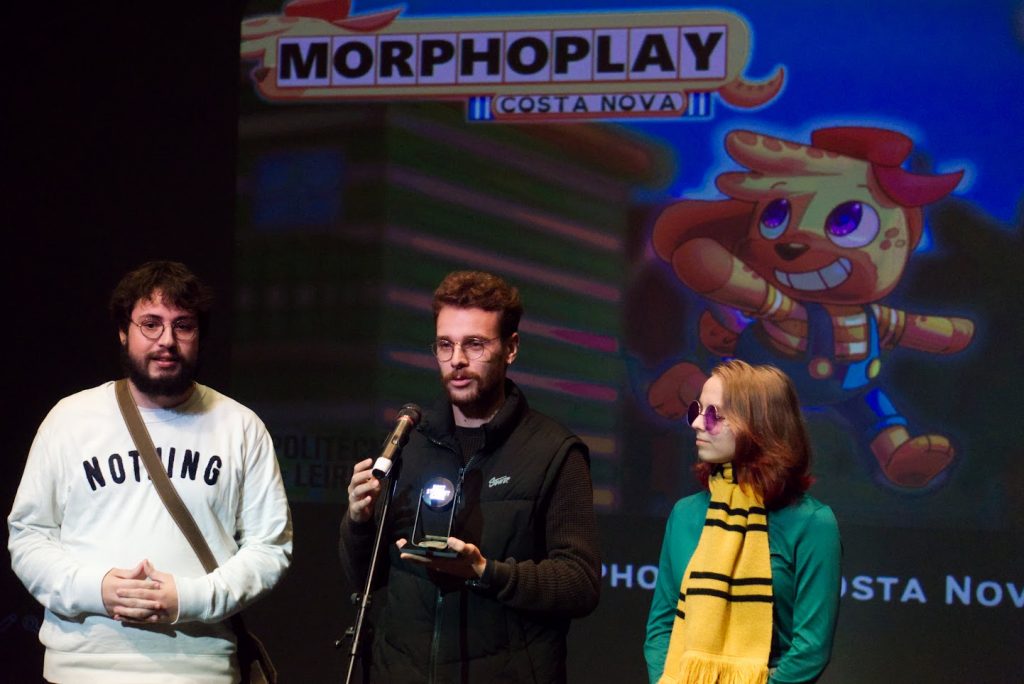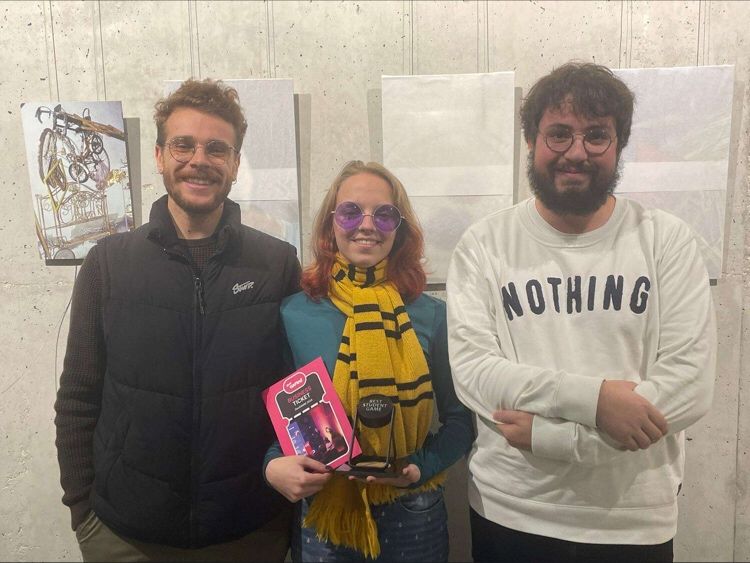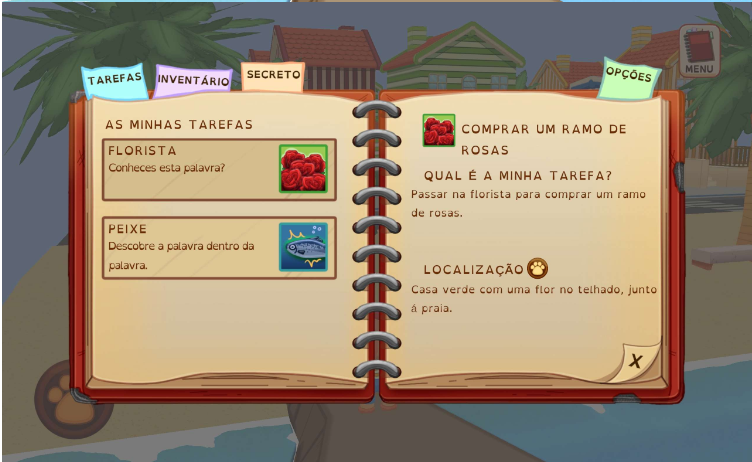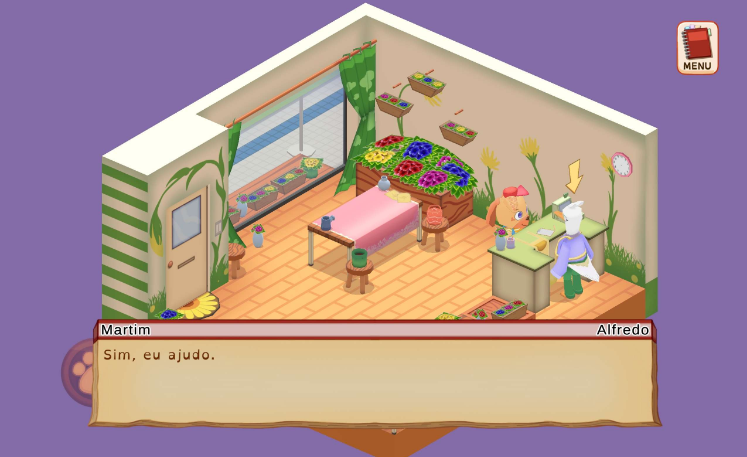Morphoplay, the project that consists in the creation of a prototype for the evaluation of morphological knowledge in children in the 2nd to 4th grade, was distinguished in the category of Best Student Game in the Spotlight Awards 2023, whose ceremony took place on November 20, at the Marvila Library in Lisbon.
Students of Games and Multimedia degree, from the Polytechnic of Leiria, in collaboration with researchers from ciTechCare and CIIC, Computer Science and Communication Research Centre, developed the awarded Costa Nova game, created to assess implicit and explicit morphological knowledge, by collecting linguistic data using derived words. In addition to both research units of the Polytechnic of Leiria, MorphoPlay also has the participation of the School of Arts and Humanities of the University of Lisbon, the Centre of Linguistics of the University of Lisbon (CLUL) and UNIFESP – Federal University of São Paulo, Brazil.
The project co-developed by Carlos Guerra, game developer, Marta Fortes, game artist and Afonso Simão, game designer resulted from a challenge proposed in a curricular unit of the degree, under the guidance of several mentors of CIIC, although the group had “total freedom to create a game, as immersive as possible, in order to distract these children while they were being evaluated,” says Eduarda Abrantes, lecturer, CIIC researcher and one of the project’s mentors.
“Usually, evaluations are done in a more formal way, in a closed office, where [children] have a sheet of paper to fill, and probably the results of this analysis may not be the most correct,” says the professor of Games and Multimedia degree. Based on this reality, the digital game was designed with a construction of a narrative and a distant involvement of the chosen words and the conjugation of several visual elements, which allowed “to distract the children, so that they are evaluated without noticing it”, thus providing a more realistic collection and analysis of data.
The speed with which the child selects a word is one of the collected data. Carina Pinto, ciTechCare researcher and Principal Investigator of the project clarifies that it is possible to “assess both explicit knowledge, through word decomposition tasks, identification of words of the same family and identification of odd words, all based on the morphology of European Portuguese”, as well as assess the implicit knowledge, “through the use of a task where we measure the time of reading the words and compare with normative data”.
The use of Portuguese culture as a narrative and space support is, whenever possible, privileged when it comes to the creation of new games, since it allows some proximity to the user. In this project, the scenery of Costa Nova is exactly the beach that gives name to the game, in Ílhavo, which is visible through the visual representation of the already known ‘Palheiros da Costa Nova’. “The fact that the houses are very colorful, makes children react well to this type of content”, declares the project’s game developer.
Throughout the game, there are 4 main tasks to be performed by Martim, the protagonist and the character played by the child. “In the florist, one of the first mandatory tasks, there is a small narrative, in which Martim goes to get some flowers that his grandfather asked him to. Meanwhile, a space appears on the screen where several words pop up and children have to separate them, according to a logical reason, and it is there that you can see if the children have some morphological difficulty or not”, reveals Eduarda Abrantes.
At the moment, the game development team is performing some usability tests in order to optimize the child’s experience, and by the end of the year, Carlos Guerra believes that the 4 mandatory tasks will be completed. Despite the development of the digital game, Costa Nova is only a part of the MorphoPlay project, which extends itself to several research papers and has been present in some conferences.
The projects competing for the same title of Best Student Award were, according to the game Developer, “very solid”, which caused astonishment among the team. “For us, it was a surprise, we wondered if they would understand the game, because it is different from what they usually see,” he says.
Categorized as a serious game, Costa Nova stands out for having a greater purpose, since it allows collecting information in the healthcare field. According to Carlos Guerra “it is not very common to have this type of work in Portugal and the Portuguese community of games is usually aware of these projects, which besides being funded, it also adds value [to the community]. In fact, after the event, we noticed a growth in the search for this study, and even larger companies saw our profiles”.
The CIIC researcher reinforces the constant communication throughout the project that enabled a “growth of knowledge of both sides” and underlines the innovation associated with this project in the area of linguistics and carried out in Portuguese, since most similar games do not have this diagnostic potential, which differentiates Costa Nova.
The funding granted by the Foundation for Science and Technology, with a duration of 18 months, considers in this, still prototype, the possibility “to choose part of the corpus of words that will be present in the final version and to test this corpus in a pilot study. In the future, the corpus of words will have to be increased, and we will have to make the assessment and validation of the final test”, explains the responsible for the project, Carina Pinto. The MorphoPlay project admits the evaluation to be done “in the context of a session, individually, in speech therapy, as in the context of a classroom, in a group, by having access to a tablet or mobile phone”. However, the team aims to use this tool as an intervention model.
Carlos Guerra also points out that the “game is prepared for the possibility of the professionals to add words to the game, without the need to program”, but this will require more funding.
This work was funded by Portuguese national funds provided by Fundação para a Ciência e Tecnologia, I.P. FCT/UI/05704/2020




